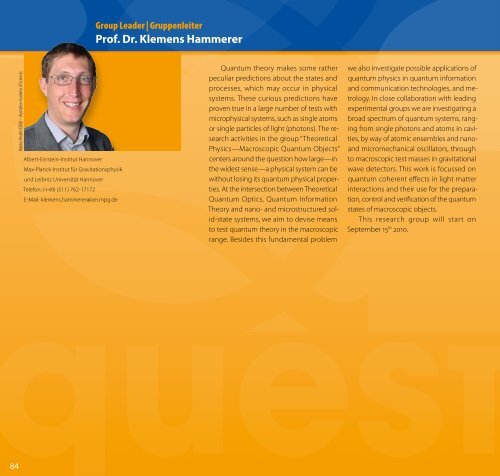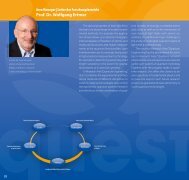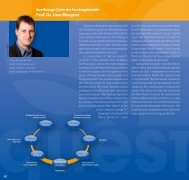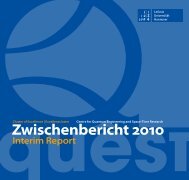Prof. Dr. Klemens Hammerer - quest
Prof. Dr. Klemens Hammerer - quest
Prof. Dr. Klemens Hammerer - quest
Sie wollen auch ein ePaper? Erhöhen Sie die Reichweite Ihrer Titel.
YUMPU macht aus Druck-PDFs automatisch weboptimierte ePaper, die Google liebt.
Markus Knabl (IQOQI – Australien Academy of Science)<br />
84<br />
Albert-Einstein-Institut Hannover<br />
Max-Planck-Institut für Gravitationsphysik<br />
und Leibniz Universität Hannover<br />
Telefon: (+49) (511) 762-17172<br />
E-Mail: klemens.hammerer@aei.mpg.de<br />
Group Leader | Gruppenleiter<br />
<strong>Prof</strong>. <strong>Dr</strong>. <strong>Klemens</strong> <strong>Hammerer</strong><br />
Quantum theory makes some rather<br />
peculiar predictions about the states and<br />
processes, which may occur in physical<br />
systems. These curious predictions have<br />
proven true in a large number of tests with<br />
microphysical systems, such as single atoms<br />
or single particles of light (photons). The research<br />
activities in the group “Theoretical<br />
Physics—Macroscopic Quantum Objects”<br />
centers around the <strong>quest</strong>ion how large—in<br />
the widest sense—a physical system can be<br />
without losing its quantum physical properties.<br />
At the intersection between Theoretical<br />
Quantum Optics, Quantum Information<br />
Theory and nano- and microstructured solid-state<br />
systems, we aim to devise means<br />
to test quantum theory in the macroscopic<br />
range. Besides this fundamental problem<br />
we also investigate possible applications of<br />
quantum physics in quantum information<br />
and communication technologies, and metrology.<br />
In close collaboration with leading<br />
experimental groups we are investigating a<br />
broad spectrum of quantum systems, ranging<br />
from single photons and atoms in cavities,<br />
by way of atomic ensembles and nano-<br />
and micromechanical oscillators, through<br />
to macroscopic test masses in gravitational<br />
wave detectors. This work is focussed on<br />
quantum coherent effects in light matter<br />
interactions and their use for the preparation,<br />
control and verification of the quantum<br />
states of macroscopic objects.<br />
This research group will start on<br />
September 15 th 2010.
Future Research Group | Zukünftige Forschungsgruppe<br />
Theoretical Physics—Macroscopic Quantum Objects<br />
Quantenzustand eines harmonischen Oszillators in einer nicht-klassischen Superposition in Wignerfunktionsdarstellung (links), im Vergleich dazu die Darstellung eines klassischen Gemisches (rechts).<br />
Quantum state of a harmonic oscillator in a non-classical superposition state in a Wigner function representation (left). By way of comparison, a representation of a classical mixture (right).<br />
Die Quantentheorie macht einige äußerst bemerkenswerte<br />
Aussagen über Zustände und Vorgänge, die in physikalischen<br />
Systemen auftreten können. Diese merkwürdigen<br />
Vorhersagen erwiesen sich bereits in einer Vielzahl an Tests<br />
mit mikrophysikalischen Systemen, wie zum Beispiel mit<br />
einzelnen Atomen oder einzelnen Lichtteilchen (Photonen),<br />
als unerschütterlich. Die Forschung der Gruppe „Theoretical<br />
Physics – Macroscopic Quantum Objects“ dreht sich um die<br />
zentrale Frage, wie groß – im weitesten Sinne – ein physikalisches<br />
System sein kann, ohne seine quantenphysikalischen<br />
Eigenschaften zu verlieren. An der Schnittstelle zwischen<br />
theoretischer Quantenoptik, Quanteninformationstheorie<br />
und nano- und mikrostrukturierten Festkörpersystemen<br />
sollen Wege gefunden werden, um die Quantentheorie im<br />
Makrokosmos zu testen. Neben dieser fundamentalen Fra-<br />
gestellung werden auch mögliche Anwendungen der Quantenphysik<br />
in der Quanteninformations- und Quantenkommunikationstechnologie<br />
sowie der Metrologie untersucht.<br />
In enger Zusammenarbeit mit jeweils führenden experimentellen<br />
Gruppen befassen wir uns dabei mit einem breiten<br />
Spektrum von Quantensystemen, von einzelnen Photonen<br />
und Atomen in Fabry-Perot-Resonatoren über atomare Ensembles<br />
und nano- oder mikromechanische Oszillatoren<br />
bis hin zu makroskopischen Testmassen in Gravitationswellendetektoren.<br />
Der Fokus der Arbeiten liegt in der Nutzung<br />
von quantenkohärenten Effekten in der Wechselwirkung<br />
von Licht und Materie, um den Quantenzustand massiver,<br />
makroskopischer Objekte präparieren, kontrollieren und verifizieren<br />
zu können.<br />
Diese Arbeitsgruppe beginnt am 15. September 2010.<br />
<strong>Klemens</strong> <strong>Hammerer</strong><br />
85
privat<br />
86<br />
Institut für Theoretische Physik<br />
Leibniz Universität Hannover<br />
Telefon: (+49) (511) 762 17508<br />
E-Mail: tobias.osborne@itp.uni-hannover.de<br />
Group Leader | Gruppenleiter<br />
<strong>Prof</strong>. <strong>Dr</strong>. Tobias J. Osborne<br />
A key objective of this research group is<br />
the development of interdisciplinary results<br />
exploiting quantum information concepts<br />
in adjoining disciplines. One ongoing project<br />
in this area is the development of new<br />
theoretical tools in condensed matter physics<br />
to obtain insights into the properties of<br />
quantum entanglement. This has resulted<br />
in a series of results highlighting quantum<br />
entanglement as the key physical property<br />
underlying strongly correlated quantum phenomena<br />
such as quantum phase transitions.<br />
A by-product of this investigation has been<br />
the development of general new theoretical<br />
tools for understanding the non-equilibrium<br />
phenomena of strongly-correlated quantum<br />
spin systems. One important result which has<br />
emerged, has been the identification of the<br />
key role information propagation plays in the<br />
simulatability of a complex quantum system.<br />
Weitere Forschungsprojekte Further Research Projects<br />
» Variationsprinzip und Wellenfunktionen der Quantenfeldtheorie<br />
» Lokalisierung für ungeordnete Multi-Teilchen-Systeme<br />
» Spektraleigenschaften der Quantenfeldsysteme<br />
» Development of variational wavefunctionals for low-dimensional quantum field<br />
theories<br />
» Disorder and localisation for multi-particle dynamical systems<br />
» Spectral properties of quantum field systems<br />
Kooperationen Collaborations<br />
» Quantenoptik, Quanten-Nanophysik, Quanteninformation, Universität Wien, Österreich<br />
» DAMTP, Cambridge University, Großbritannien<br />
» Max-Planck-Institut für Quantenoptik<br />
» Quanteninformation, Universität Potsdam<br />
» Institute for Quantum Information, Caltech, USA<br />
» Finanzmathematik, 2007-2008<br />
» Differentialgleichungen, 2005-2008<br />
» Elektromagnetische Theorie, 2006<br />
» Chaostheorie, 2005-2008<br />
» Partner des Wissenschaftskollegs zu Berlin, 2009-2010<br />
» Auszeichnung für beste Lehre, Royal Holloway College<br />
» Quantum Optics, Quantum Nanophysics, Quantum Information, Universität Wien,<br />
Austria<br />
» DAMTP, Cambridge University, Great Britain<br />
» Max-Planck-Institut für Quantenoptik<br />
» Quantum information theory, Universität Potsdam, Germany<br />
» Institute for Quantum Information, Caltech, USA<br />
Lehre (Auszug) Selected Teaching<br />
» Financial mathematics, 2007-2008<br />
» Differential equations, 2005-2008<br />
» Electromagnetic theory, 2006<br />
» Chaos theory, 2005-2008<br />
Auszeichnungen Awards<br />
» Fellow of the Wissenschaftskolleg zu Berlin, 2009-2010<br />
» Royal Holloway college best practice teaching prize<br />
This has led to a general efficient procedure for<br />
simulating the dynamics of strongly interacting<br />
quantum spin systems.<br />
In the same area, insights in quantum information<br />
theory have also been used to understand<br />
the phenomena of Anderson localisation<br />
in strongly interacting scenarios. Here<br />
the localisation phenomena slows down the<br />
propagation of information through a complex<br />
quantum system rendering it efficiently<br />
simulatable. It is now expected that new insights<br />
into the properties of quantum cellular<br />
automata will lead to general results establishing<br />
Anderson localisation for a much wider<br />
class of systems than hitherto known.<br />
Recently, the application of quantuminformation<br />
theoretical tools to the more remote<br />
discipline of quantum field theory was<br />
initiated. In this respect quantum-entanglement<br />
inspired results have already led to the<br />
first successful application of the variational<br />
principle to a non-trivial relativistic quantum<br />
field theory. In the longer term, the aim of<br />
this promising wide-ranging project is to<br />
obtain results explicating confinement and<br />
non-equilibrium physics for gauge field<br />
theories.
Future Research Group | Zukünftige Forschungsgruppe<br />
Quantum Information<br />
Illustration der Dynamik der Korrelationsfunktionen für ein interagierendes<br />
Teilchen-System in einem ungeordneten Feld.<br />
Illustration of the dynamics of the correlation functions of an interacting particle<br />
system in a disordered field.<br />
Ein wesentliches Ziel dieser Forschungsgruppe ist die<br />
Entwicklung interdisziplinärer Ergebnisse durch Ausnutzung<br />
der Erkenntnisse der Quanteninformation in benachbarten<br />
Disziplinen. Ein laufendes Projekt in dieser Richtung ist die<br />
Entwicklung neuer Werkzeuge für die Theorie der Kondensierten<br />
Materie, bei der Einsichten der Verschränkungstheorie<br />
zum Einsatz kommen. Dies hat zu einer Gruppe von<br />
Ergebnissen geführt, die Verschränkung als physikalische<br />
Schlüsseleigenschaft für Phänomene wie Quantenphasenübergänge<br />
beleuchten. Ein Nebenprodukt dieser Untersuchung<br />
war die Entwicklung von allgemeinen Methoden für<br />
Nichtgleichgewichtsphänomene in stark korrelierten Quantenspinsystemen.<br />
Ein wichtiger Schritt war die Erkenntnis der<br />
Schlüsselrolle der Informationsausbreitung für die Simulierbarkeit<br />
komplexer Quantensysteme. Daraus ergaben sich<br />
effiziente Verfahren zur Simulation der Dynamik stark wechselwirkender<br />
Spinsysteme.<br />
100<br />
80<br />
60<br />
40<br />
20<br />
100<br />
80<br />
60<br />
40<br />
20<br />
10 20 30 40 50<br />
10 20 30 40 50<br />
100<br />
80<br />
60<br />
40<br />
20<br />
100<br />
80<br />
60<br />
40<br />
20<br />
10 20 30 40 50<br />
10 20 30 40 50<br />
In dieser Richtung fortschreitend wurden Einsichten<br />
der Quanteninformationstheorie wichtig für das Verständnis<br />
der Anderson-Lokalisierung in stark wechselwirkenden<br />
Szenarien. Dabei verlangsamt die Lokalisierung die Informationsausbreitung,<br />
und macht damit das komplexe System<br />
effizient simulierbar. Es wird erwartet, dass Erkenntnisse über<br />
Quantenzellularautomaten dazu beitragen werden, das Phänomen<br />
der Anderson-Lokalisierung für eine viel größere Systemklasse<br />
als bisher nachzuweisen.<br />
Kürzlich wurde auch die Anwendung von Methoden<br />
der Quanteninformationstheorie auf die entfernter liegende<br />
Quantenfeldtheorie in Angriff genommen. Derart inspirierte<br />
Ergebnisse haben schon zur ersten erfolgreichen<br />
Anwendung des Variationsprinzips auf eine nicht-triviale<br />
relativistische Quantenfeldtheorie geführt. In der weiteren<br />
Entwicklung dieses langfristigen Projekts werden Ergebnisse<br />
zum Confinement und zur Nichtgleichgewichtsphysik von<br />
Eichtheorien angestrebt.<br />
Tobias J. Osborne<br />
87
Vockerodt (QUEST)<br />
88<br />
Institut für Theoretische Physik<br />
Leibniz Universität Hannover<br />
Telefon: (+49) (511) 762 17501<br />
E-Mail: reinhard.werner@itp.uni-hannover.de<br />
Group Leader | Gruppenleiter<br />
<strong>Prof</strong>. <strong>Dr</strong>. Reinhard F. Werner<br />
Theoretical quantum information research<br />
in QUEST spans the full breadth of the discipline,<br />
from quantum algorithm development<br />
for quantum computers and theoretical quantum<br />
Shannon theory through to practical applications<br />
with research on quantum control,<br />
experimental implementations of quantum<br />
computers, and quantum cryptography.<br />
This research group, led by <strong>Prof</strong>. <strong>Dr</strong>. Reinhard<br />
F. Werner, transferred from the Technical<br />
University of Braunschweig in April 2009, and<br />
is well-known for the mathematically rigorous<br />
analysis of quantum information phenomena.<br />
Fundamental contributions include the now<br />
accepted mathematical definition of entanglement<br />
(1983), the analysis of general teleportation<br />
processes, a quantitative formulation of<br />
Weitere Forschungsprojekte Further Research Projects<br />
» Datenstrukturen und Domänen für Quanteninformation<br />
» 1/N-Korrekturen für allgemeine Mean-Field Theorien<br />
» Modellierung von Korrelationen zwischen Quantenprozessen in kontinuierlicher Zeit<br />
» Axiomatik der Quantentheorie und allgemeinerer statistischer Theorien<br />
» Matrix geordnete Operatorräume<br />
» Albert-Einstein-Institut, Hannover<br />
» Instiut für Quantenoptik, Hannover<br />
» BMBF-Projekte<br />
» EphQuam<br />
» QuORep<br />
» EU-Projekte<br />
» Q-ESSENCE<br />
» COQUIT<br />
» CORNER<br />
» Quanteninformationstheorie, 2009<br />
» Statistische Mechanik and Thermodynamik, 2009/2010<br />
» Functionalanalysis für Physiker, 2010<br />
» Rechenmethoden der Physik, 2010/2011<br />
» Data structures and domains for quantum information<br />
» 1/N correction to general mean field theories<br />
» Modeling of correlations between continuous time processes<br />
» Axiomatics of quantum theory and more general statistical theories and their composition<br />
» Matrix ordered operator spaces<br />
Kooperationen Collaborations<br />
» Albert Einstein Institute, Hannover, Germany<br />
» Instiute for Quantum Optics, Hannover, Germany<br />
» BMBF Projects<br />
» EphQuam<br />
» QuORep<br />
» EU Projects<br />
» Q-ESSENCE<br />
» COQUIT<br />
» CORNER<br />
Lehre (Auszug) Selected Teaching<br />
» Quantum Information Theory, 2009<br />
» Statistical Mechanics and Thermodynamics, 2009/2010<br />
» Functional Analysis for Physicists, 2010<br />
» Computational Methods of Physics, 2010/2011<br />
the trade-off between information gain and<br />
disturbance for quantum measurements.<br />
Current research areas extend from quantum<br />
lattice systems with discrete time dynamics,<br />
such as quantum walks and cellular automata,<br />
quantum cryptography from general dependencies<br />
between Bell-type correlations and security<br />
through to the theoretical part of the<br />
QUEST project, “Crypto on Campus”, complexity<br />
of quantum algorithms, and general issues<br />
of time in quantum theory (together with Jun.<br />
<strong>Prof</strong>. Andreas Ruschhaupt). A topic, which is<br />
of increasing relevance for the group, is the<br />
application of entanglement theory, complexity<br />
ideas, and control theory to the analysis of<br />
complex systems.
Future Research Group | Zukünftige Forschungsgruppe<br />
Quantum Information<br />
Kaustik, deren Dichte die asymptotische<br />
Ortsverteilung einer zweidimensionalen<br />
unitären Quanten-<br />
Irrfahrt beschreibt.<br />
Caustic whose density represents the<br />
asymptotic position distribution of a<br />
unitary quantum walk on a 2-dimen-<br />
sional lattice.<br />
Die Forschung zur Quanteninformationstheorie in<br />
QUEST umspannt die gesamte Breite dieses Gebiets, von der<br />
Entwicklung von Algorithmen für Quantencomputer und<br />
der quantentheoretischen Entsprechung der Shannonschen<br />
Informationstheorie bis hin zu praktischen Anwendungen<br />
der Quantenkontrolle, experimentellen Realisierungen von<br />
Quantencomputern und der Quantenkryptographie.<br />
Diese Arbeitsgruppe kam im April 2009 von der Technischen<br />
Universität Braunschweig nach Hannover und ist vor<br />
allem für die Untersuchung von Phänomenen der Quanteninformation<br />
mit mathematisch strengen Methoden bekannt.<br />
Zu den grundlegenden Beiträgen gehören die mathematische<br />
Definition der Verschränktheit von 1983, die Analyse<br />
allgemeiner Teleportationsprozesse sowie eine quantitative<br />
Formulierung des Wechselverhältnisses von Informationsgewinn<br />
und Störung des Systems bei Quantenmessungen.<br />
Die gegenwärtigen Forschungsaktivitäten betreffen<br />
Quantengittersysteme mit Dynamik in diskreter Zeit, wie<br />
zum Beispiel Quantenirrfahrten und Quantenzellularautomaten,<br />
ferner die Quantenkryptographie, von den allgemeinen<br />
Zusammenhängen zwischen Bell-artigen Korrelationen<br />
und Sicherheit hin zum Theorieteil des QUEST-Projekts<br />
„Crypto on Campus“. Weiterhin wird in Zusammenarbeit mit<br />
Jun.-<strong>Prof</strong>. <strong>Dr</strong>. Andreas Ruschhaupt die Rolle der Zeit in der<br />
Quantenmechanik untersucht. Ein Thema mit wachsender<br />
Bedeutung ist die Anwendung von Verschränkungstheorie<br />
und Ideen aus Komplexitäts- und Kontrolltheorie auf die<br />
Analyse komplexer Systeme.<br />
Reinhard F. Werner<br />
89





